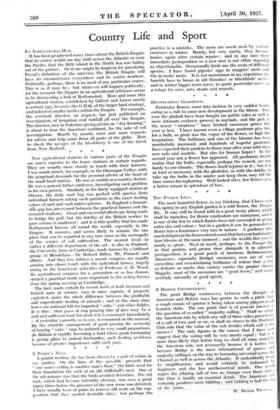Country Life and Sport
AN AGRICULTURAL HUB.
It has been prophesied many times about the British Empire that its centre would one day shift across the Atlantic or even the Pacific, that the little island in the North Sea was fading out of the picture. Or if one might be forgiven for parodying Pascal's definition of the universe, the British Empire will have its circumference everywhere and its centre nowhere. Politically, perhaps, there is no need of any particular centre. This is as it may be ; but whatever will happen politically, for the moment the Empire in an agricultural reference seems to be discos ering a hub at Rothamsted. More and more this agricultural station, established by Gilbert and Lewes nearly a century ago, becomes the G.H.Q. of the larger land strategy, and indeed of smaller tactics within the Empire. For example, the assistant director, on request, has just published an investigation of irrigation and rainfall all over the Empire. The director, now in Palestine giving advice on "dry-farming," is about to tour the American continent, for the sake of soil investigation. Month by month, more and more requests for advice and help conic from all parts of the globe. How to cheek the ravages of the blackberry is one of the latest from New Zealand.
Now agricultural stations in various parts of the Empire are much superior to the home stations in certain regards. They arc usually more closely in touch with their farmers. I was much struck, for example, in the Okanagan Valley, with the perpetual demands for the personal advice of the head of the small local station. He was as mobile as a country doctor. He was a general father confessor, investigating each problem in his own person. Similarly in the finely equipped station at Ottawa, the daily mail bag was packed with queries from individual farmers asking such questions as the exact feeding values of such and such native grasses. In England a lament- able gap has intervened between the practical farmer and the research students. Great and successful efforts are being made to bridge the gulf, but the fidelity of the British worker to pure science is unaltered ; and it is this quality that has made Rothamsted famous all round the world, especially in the Empire. It remains, and seems likely to remain, the one Place that can be regarded in any true sense as the metropolis of the science of soil cultivation. The nearest rival—in rather a different department of the art—is also in England, the University fann of Cambridge, made famous by a brilliant group of Mendelians—Sir Roland Biffen, Mr. Pumiett and others. And they too, witness a recent congress, are rapidly coming into closer touch with the individual farmer, largely owing to the beneficent activities of Professor J. B. Wood. No agricultural congress for a generation or so has demon- strated a practical truth more important to the acting fanner than the spring meeting at Cambridge.
The fact, made certain by recent work of both German and British men of science, may in some regions, if properly exploited, make the whole difference between the profitable and unprofitable feeding of animals ; and at the same time lower our national bill for imported " cake " and other fodder. It is this : that grass at any growing time of year may be a rich and sufficient food for stock if it is consumed immediately —if yesterday's growth, so to say, is consumed on the morrow, By the scientific management of good grazing the necessity of buying " cake " may be reduced to very small proportions. As Britain is rapidly becoming a land where grain husbandry is giving place to animal husbandry, such feeding problems become of greater importance with each year.
*










































 Previous page
Previous page